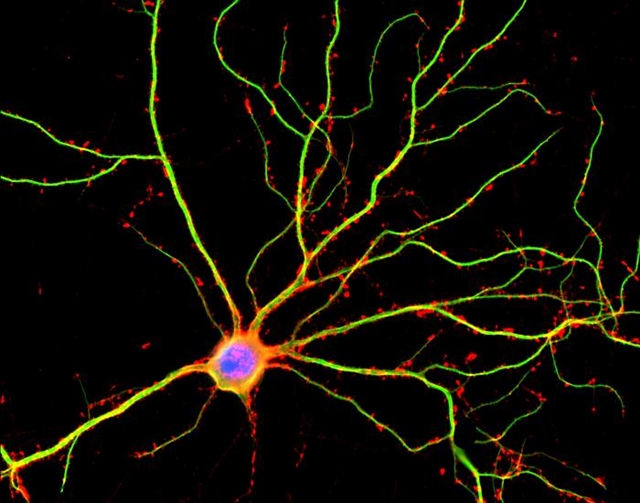15 August 2018. Pain drugs made from peptides, small protein-like compounds, and guided by antibodies are being developed as alternatives to prescription opioids to treat moderate to severe pain. Peptide Logic, a biotechnology company in San Diego, is receiving a 2-year $2.9 million Small Business Innovation Research award from National Institute on Drug Abuse, part of National Institutes of Health, to advance its lead pain therapy candidate to the the start of clinical trials.
Peptide Logic develops synthetic peptides, short chains of amino acids similar to proteins. The company’s peptides are designed to regulate G-protein-coupled receptors, a ubiquitous protein on cell surfaces and a target for up to half of today’s drugs. In this case, G-protein-coupled receptors act as gateways for kappa opioid receptors, or KORs, proteins found on the surface of nerve cells, which in their activated state can stop pain signals.
Today’s prescription opioid drugs target mu-opioid receptors to reduce the intensity of pain signals to the brain, particularly regions of the brain controlling emotion, which reduces effects of the pain stimulus. Abuse of prescription opioid drugs, as well as heroin and fentanyl sold on the street, has become a serious national public health emergency, with overdose deaths from these drugs in 2018 numbering more than 115 per day, according to National Institute on Drug Abuse. A report by the National Academies of Sciences, Engineering, and Medicine in July 2017 spells out the full scope of the crisis beyond overdose deaths, with some 2 million Americans age 12 and older addicted to prescription opioid drugs and another 600,000 addicted to heroin.
A key drawback of KORs, however, is that they too are found on brain cells. Peptide Logic’s solution takes an existing pain drug targeting KORs only in peripheral nerve cells, those outside of the brain and spinal cord, to relieve pain without affecting brain cells. This current drug, code-named CR845 by Cara Therapeutics, is being tested to treat several types of pain and severe itching. But it currently has a short active lifetime, according to Peptide Logic, requiring multiple intravenous doses a day. Peptide Logic proposes combining the KOR stimulators in CR845 with a Peptide Logic synthetic antibody acting as a persistent carrier to provide long-acting pain relief.
In an earlier preliminary study, Peptide Logic found a long-acting pain drug targeting KORs to be feasible. In the new project, the company plans to advance its technology to produce a treatment for moderate to severe pain that can be given once a week as an injection under the skin, instead of the multiple infusions needed today. Peptide Logic also expects to specify and validate a range of pain types the treatments can address, and test the treatment candidates in both female and male animals in preparation for an investigational new drug application to the Food and Drug Administration. That application is, in effect, a request to begin clinical trials.
The award for the project was made under NIH’s Small Business Innovation Research program that sets aside funding for small, early-stage businesses in the health care and life science fields. In the current (2018) fiscal year, NIH expects to channel more than $1 billion into its small business set-aside programs.
More from Science & Enterprise:
- Despite Crisis, U.S. Prescription Opioid Use Remains High
- Trials Show Pain Drug Reduces Post-Surgery Opioid Use
- NIH Exec: Research Offers Opioid Crisis Solutions
- Highly Targeted Opioid Designed to Avoid Side Effects
- Current Drug Helps Cut Opioid Use After Surgery
* * *


 RSS - Posts
RSS - Posts
[…] a result, new ways of treating acute and chronic pain are badly needed. A story last week in Science & Enterprise reports on a new NIH grant to the company Peptide Logic in San Diego, developing synthetic […]